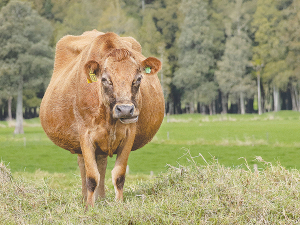Planning to calve in the right conditions is essential for cow and calf health. Avoid calving in muddy conditions to decrease the risk of death and infections for both the cow and the calf.
Grouping cows by calving date and removing them from crop paddocks well before calving will help protect cow and calf welfare. Remove animals from intensively grazed winter paddocks at least two weeks before their expected calving date.
If a calf is born on crop, promptly collect and remove the calf and cow to a drier area. Know what you will do with a slip or early calver (include actions to take for cow and calf).
Providing the right environment for calving gives the best outcome for calves and dams.
Timed pregnancy diagnosis allows you to be well organised by identifying the animals closest to calving to move to the springer/calving area. Talk to your vet about dating pregnancies at scanning.
Be careful in mobs fed fodder beet or high yielding swedes, as bagging, or springing up, is limited in cows on low-protein feeds. If feeding fodder beet, detail how you observe springing udders since cows might not bag up as much.
When designing your plan, consider the welfare of your cows and any potential environmental impact. Remember to factor in cold stress as it can have a greater impact on cows with low body condition score.
If a cow is clean and dry and there is little wind or rain, cold stress is rare until temperatures fall below -10°C.
The factors that increase the risk of cold stress are:
- Combination of cold temperatures, rain and wind
- Wet muddy ground conditions
- Low body condition score
- Low feeding levels
- Sickness
- No access to shelter
Key Takeaways
- Cows prefer 10-12 hours of lying time every day
- Calving in muddy environments can increase risks for calves and cows, so you should consider measures like grouping cows by calving date and removing them from crop paddocks well before calving.
- If a cow is clean and dry and there is little wind or rain, cold stress is rate under ambient temperatures fall below -10°C.
Article - DairyNZ


















